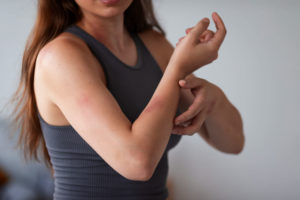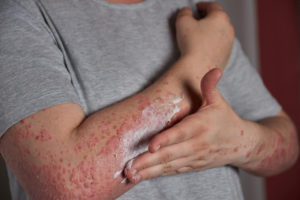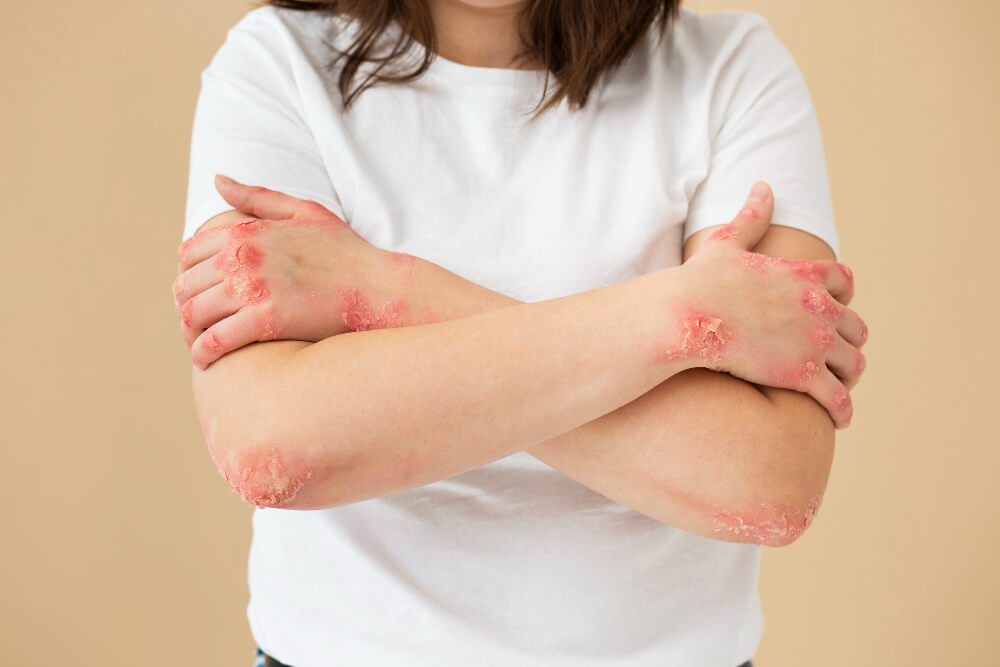Whilst years have passed since the discovery of the disease, our topic of discussion remains the same, which is, Can eczema be cured?
What is Eczema?
Eczema is one of the most common and problematic skin conditions. Your skin will become dry, itchy, and bumpy as a result of this. This disorder decreases your skin’s barrier function, which is in charge of retaining moisture and safeguarding your body from external factors.
Dermatitis refers to a group of skin disorders that produce inflammation, and eczema is known as a variant of dermatitis. We will discuss the eczema causes, and symptoms, including the eczema cure methods so continue reading to find out and uncover together how the condition can be dealt with.
Eczema Symptoms
Symptoms of eczema include:
- Dry skin.
- Skin rash
- Itchy skin
- Swelling
- Thick patches of skin
- Bumps on your skin
- Flaky, scaly or crusty skin
Eczema may show itself differently in each individual. It can be purple, brown, or gray if you have dark skin. Also, eczema rash can seem pink, crimson, or purple if you have light skin.
People with Eczema can experience symptoms on any part of their body, from hands, neck, feet, knees, and face, to even the genitals.
Eczema Causes
Usually, eczema runs in genes and genetic variations are largely known as the eczema causes, but these can be noted as the causal factors of eczema.

1. Immune System
Your immune system reacts inappropriately to little irritants or allergens (catalysts) in your environment if you have eczema. When you come into contact with a trigger, your immune system interprets these minor irritants as foreign invaders, such as bacteria or viruses, that might harm your body.
As a result of the triggers, your body’s natural defense system is activated. Inflammation is your immune system’s protective mechanism. Eczema symptoms on your skin are caused by inflammation.
2. Genes
If your family has a history of eczema or dermatitis, you are more likely to develop it. If you have a family history of asthma, hay fever, or allergies, you are at a higher risk. Pollen, pet hair, and foods that cause an allergic reaction are examples of common allergies. You may possibly have a mutation in your genes that causes your skin’s barrier function to malfunction.
3. Environment
There are numerous things in your environment that may bother your skin. Exposure to smoke, air pollution, harsh soaps, wool textiles, and various skin care products are a few examples. Dry and itchy skin can result from climates with low humidity or dry air. Heat and heavy humidity can promote sweating, which might aggravate your irritation.
4. Stress
Your mental health can also be among the eczema causes. It may have an impact on the health of your skin, causing an eczema flare-up. If you are stressed, anxious, or depressed, your eczema symptoms may flare up more frequently.
What causes eczema flare-ups?
Each person diagnosed with eczema is affected differently. Everybody can experience different symptoms. Eczema is commonly caused by the following triggers:
-Whether that is dry
-Fabrics are a type of clothing material
-Cosmetics or skin care goods
-Pollutants and smoke are both present
-Laundry detergents and soaps
-Stress or your emotional health
-Touching anything to which you are allergic
Can Eczema be Cured?
Now back to the question, Can eczema be cured? Your doctor may recommend more testing to rule out other illnesses and confirm your diagnosis. A test for allergies, blood testing to rule out other reasons for the rash that aren’t related to dermatitis, and a skin biopsy is used to differentiate one type of dermatitis from another.

Your eczema therapy is unique to you and the reason for your symptoms. eczema cure options include:
-When you have dry skin, use moderate or sensitive skin creams throughout the day. When your skin is moist from a bath or shower, apply moisturizer.
-Topical drugs, such as topical steroids, should be applied to your skin as directed by your provider.
-To relieve irritation and swelling, take anti-inflammatory drugs, antihistamines, or corticosteroids orally.
-Immunosuppressive medications help to modify how your body’s immune system works.
-Light therapy can help you improve the condition of your skin and get rid of imperfections.
-Avoid stimuli that aggravate eczema symptoms.
Conclusion
Eczema affects many people and can be difficult to manage. However, your eczema may go away at times. This is referred to as a remission time. Other times, you may experience a flare-up, in which your symptoms appear or worsen. The goal of eczema cure is to keep flare-ups at bay and your symptoms from worsening. Avoid causes, moisturize, take your medication, and follow your doctor’s directions.
FAQs-
Can Eczema be cured?
No, there is no known eczema cure, but there are treatments available that can easen up the condition making it manageable.
How do I know if I have Eczema?
Eczema is non-debilitating eczema that can be controlled with good skincare, with half of the children growing out or improving by puberty, while others continue to suffer from it.
When will I feel better after taking the Eczema treatment?
Topical or oral drugs provided by your healthcare professional aid in the relief of your symptoms, but the condition can take up to several weeks to see reduction in symptoms.
How do I manage Eczema symptoms?
Because of heredity, treating eczema can be difficult, but altering the environment and levels of stress can help manage itching, pain, and avoid infection and flare-ups.


Pingback: Can Almond Oil be Used for Skin Care? Unravel the Truth - Wild Oak Skincare